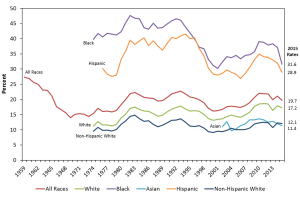Pollan’s book, while providing very tangible and well researched explanations about the shift in dominant food paradigms and practices across the world, is fundamentally flawed in one way: its applicability. Specifically, In Defence of Food, in my opinion, has blind spots at the intersection of nutritionism and class/economic status, and is subsequently racially flawed also.

Pollan, a White man.
In Part III of the book, Pollan contends that we should endeavour to “…depart the realms” that the ‘Western diet’ rules, including supermarkets, convenience stores and fast-food outlets (158). He also argues humans wishing to live a healthier, disease free life, should pursue a ‘shorter food chain’, looking toward farmer’s markets as a source of more organic produce for consumption. The problem with this is that organic foods, on average, are 47% more expensive than regular products that you would find in a supermarket (source). So, while Pollan may suggest eating said diet, this would be wildly unattainable for the much of the middle class that make up 60% of the world’s population. Thus, this portion of the population is forced to revert to food deemed as ‘fattening’, according to Pollan, with little room for products that do not resort to their original product’s nutritional compound. 
From this, we can further extrapolate that Pollan’s book is also flawed in its negligence of racial and ethnic issues, especially in the United States. For instance, in a study conducted by the American Psychological Association, they concluded that minority racial groups are far more likely to experience poverty in the US than their White counterparts (source). Using Pollan’s same science, I believe what he is describing is not an ‘obesity epidemic’, but rather a systemic race issue, that in its intersection with food consumption, further disenfranchises ethnic minorities.

Racial Group and Poverty in the US (Not study cited above)
